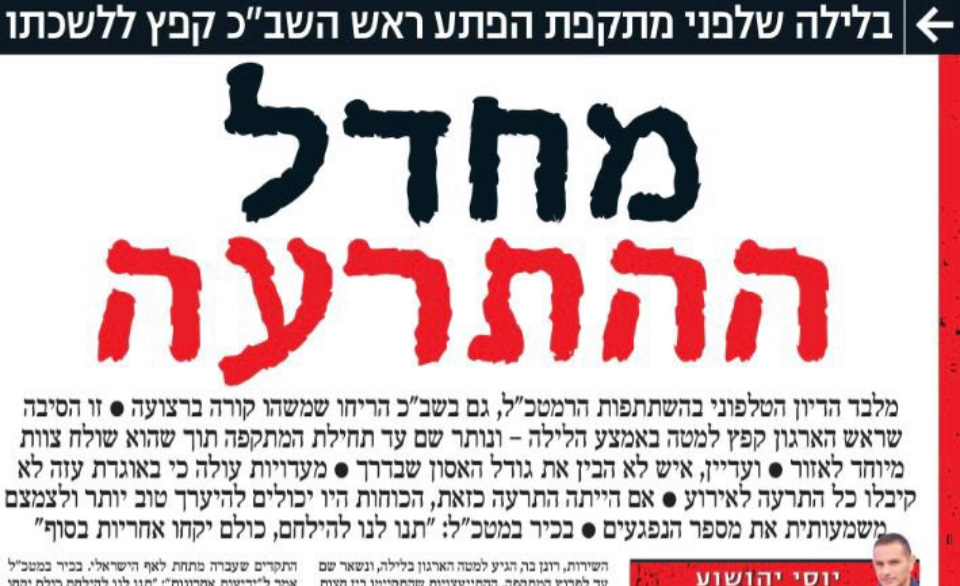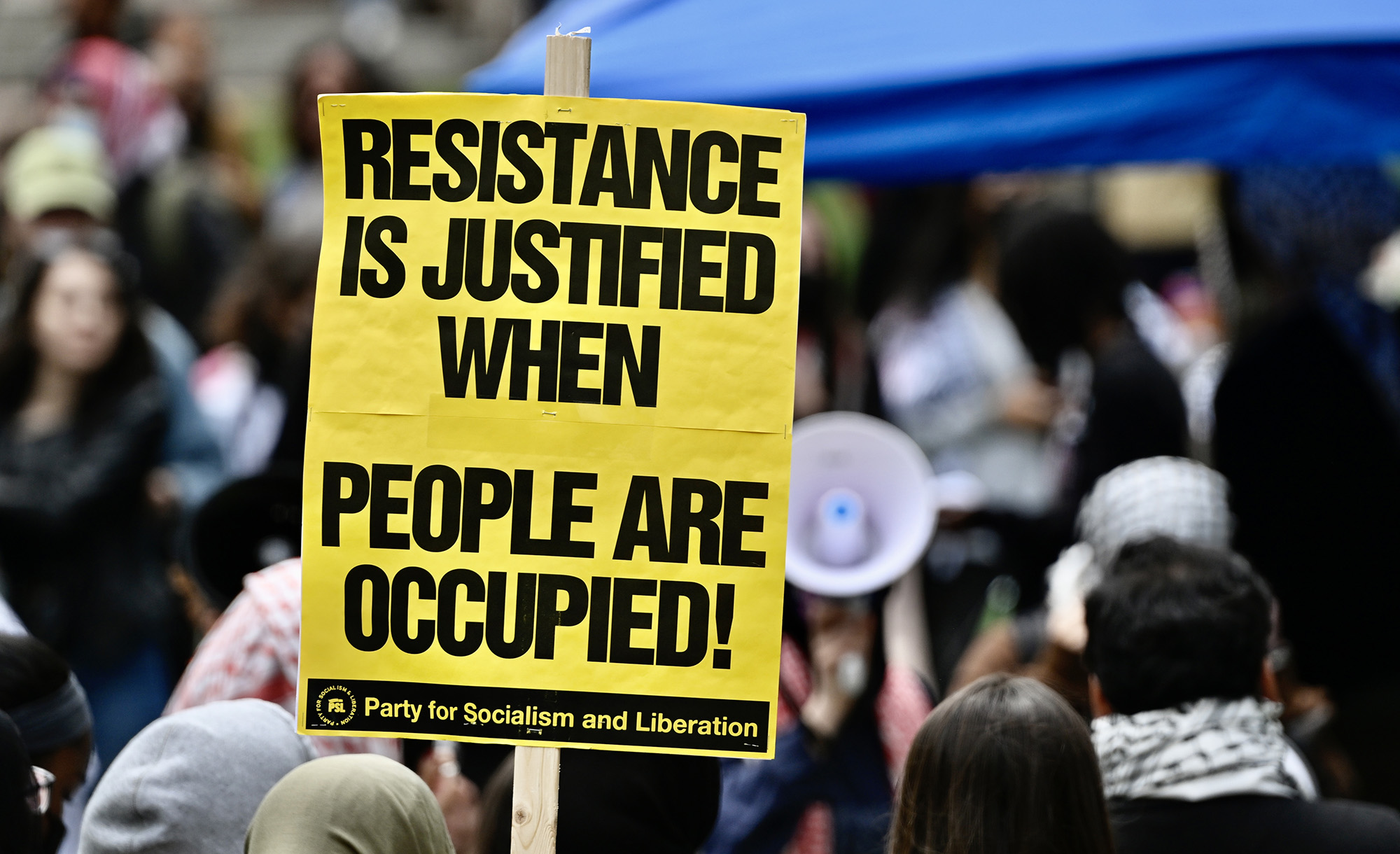Always be careful what you ask for!
A few weeks before last Yom Kippur, Jonathan Silver, Mosaic’s editor, turned to me with a query. He was preparing for publication Michael Doran’s essay “The Hidden Calculation Behind the Yom Kippur War,” which appeared in Mosaic earlier this month, and he wanted to know how I would translate the Hebrew word meḥdal. In his essay, Doran had written:
Israelis have at their fingertips all the necessary facts [about the 1973 war] to tell a compelling story of triumph over tragedy, much like the one Americans tell themselves about World War II. A sneak attack by the enemy caught the lion sleeping. He made some early missteps, but once stirred from his slumber, he ripped his enemies to shreds. The [Golda] Meir government tried to market such a tale when the war ended, but the public rejected it out of hand. Israel’s collective memory immediately conceived of the war as neither a victory nor a defeat. . . . The word it chose was meḥdal, which technically means an act of omission or neglect that leads to great harm. Israelis remember the Yom Kippur War not just as a meḥdal, but as “the meḥdal”—the meḥdal par excellence.
I told Jonathan that meḥdal had a close equivalent in English but one that, unfortunately, he wouldn’t be able to use—namely, “f—-up.” He might be able, I added, to get away with “screw-up,” but the watered-down nature of “screw-up” diluted the emotions that meḥdal, especially when applied to the Yom Kippur War, arouses in Israelis. A “screw-up” to the American ear sounds like a “f—-up” that isn’t so serious. The opening days of the Yom Kippur War were a catastrophe.
“Well, let me know if you think of anything,” Jonathan said to me. “In any case, perhaps you’d like to write a column on meḥdal.”
“I might,” I said. “But I already have a topic for this Yom Kippur. I’ll need another peg to hang meḥdal on. Let’s wait till one comes along.”
Who could have dreamed in their worst dreams that this would happen so soon?
I don’t know whether a linguistic discussion is appropriate for a time like this in which, as I write, Israel is deep in grief for its dead, at the height of the fury that its troops will take with them into Gaza, and still in shock from the meḥdal that—incredibly, almost 50 years to the day from that of the Yom Kippur War!—made the events of the past days possible. I could hardly, though, have written this week’s column about anything else.
Although meḥdal’s emotional resonance, which will now be doubled and redoubled, goes back no further than 1973, the word itself is an old one. It is built on the biblical verb ḥadal, “to cease” or “to cease to be,” which, in the second of these two senses (Hamlet’s “to be or not to be” is lihyot o laḥdol in Hebrew), yields various compound terms. Thus, we have ḥadal-ishim, “ceased-of-person,” a worthless or ineffectual individual; ḥadal-onim, “ceased-of-strength,” someone who is helpless; ḥadal-yesha, “ceased-of-being-rescued,” someone in a hopeless position; ḥadal-pera’on, “ceased-of-repayment” or insolvent, and so on. Ḥidalon, “cessation of being,” denotes in Hebrew a state of near non-existence. One never finds ḥadal used in a positive sense. Theoretically, it is possible to say something like ḥadal-tsarot, “ceased-of-troubles,” that is, unworried or carefree, but in actuality there are no such expressions.
The earliest documented use of meḥdal dates to the 10th century. It occurs in the Sefer ha-Mitsvot, the “Book of Commandments,” a rhymed poetic rephrasing of the commandments of the Bible by the great rabbinic leader and religious philosopher Saadya Gaon. In summing up the sin-offering prescribed for transgressions of Mosaic Law, Saadya wrote:
He who commits a prohibited act must offer a lamb or a goat to the Heavens [ha-z’vulim]. He who commits such an act unawares must likewise make such an offering. But the Almighty, may He be praised, who pities the poor man, requires of him only turtledoves or pigeons and a tenth [measure of fine flour] for his meḥdalim. The Just One knows the case of the poor [dalim].
Saadya is here reworking several verses from Chapter 5 of the book of Leviticus, which state that should a person commit one of various forbidden acts without knowing it, such as touching an unclean carcass, he shall when appraised of what he has done, “bring his sin offering to the Lord, . . . a ewe or a she-goat, and the priest shall atone for him for his offense. And if he cannot afford so much as a sheep, he shall bring two young turtledoves or two young pigeons. . . . And if he cannot afford two turtledoves or pigeons, he shall bring as his offering a tenth of an ephah of fine flour.”
How should Saadya’s meḥdalim, the plural of meḥdal, be translated? “Oversight,” would be one way. “Negligence” would be another. “Not paying heed” might be a third. The word, as one can see, has hardly changed its meaning in a thousand years. It denoted for Saadya, as it still denotes today, a failure caused by unawareness or inattentiveness—or, to phrase it in terms of its root meaning, of a cessation of the faculties of perception which it is one’s responsibility to exercise.
In the end, Mosaic and Doran settled on “blunder.” Although this was perhaps the best that could be done, it’s imperfect. A blunder is an act of commission, something that shouldn’t have been done but was. A meḥdal, as Doran observes, is a grievous act of omission, something that should have been done but wasn’t. It’s not quite the same thing.
Such a meḥdal occurred in 1973. It has now, in an eerily similar way, occurred again. The price Israel paid in 1973 was enormous, though it led in the end to a peace agreement with Egypt, and subsequently, with other Arab countries. The price paid this time is already unbearably high and will grow higher in the weeks and months to come, nor can we know now what good may come of it. Where is the sin-offering that can atone for the meḥdal of 2023?
More about: Hebrew, Israel & Zionism







